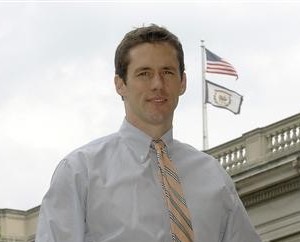 West Virginia’s new senator, Carte Goodwin (D)Senate Democrats get a little of their groove back today when a replacement for the late Sen. Robert Byrd (W. Va.) is sworn in. But don’t expect him to bail them out on climate change.
West Virginia’s new senator, Carte Goodwin (D)Senate Democrats get a little of their groove back today when a replacement for the late Sen. Robert Byrd (W. Va.) is sworn in. But don’t expect him to bail them out on climate change.
I’m a coal man: Carte Goodwin, a 36-year-old attorney, is being seen as a savior for the Dems in terms of enabling them to finally pass an extension of unemployment benefits, but he’s already identified himself as a lost cause when it comes to any kind of cap on greenhouse-gas emissions. No surprise there since a) West Virginia is Shangri-la for Big Coal, as reflected in the devotion of the state’s other Democratic senator, Jay Rockefeller, to the concept of “clean coal,” and b) the guy who appointed Goodwin, West Virginia Gov. Joe Manchin (D), said he wasn’t interested in anyone who liked an emissions cap. Byrd was by no means a slam-dunk yes on a strong climate bill, though in recent years he seemed to be leaning toward setting a price for carbon emissions. Goodwin is a slam-dunk no on any bill with a cap.
Cap dance: Not that it may matter. The current thinking around Capitol Hill is that the ship has sailed on even a utilities-only cap, let alone one across all industries (that ship has sunk). Bradford Plumer, in The Vine blog for The New Republic, sums up where things stand:
If you added all this up, would an energy bill without a cap on carbon still be worthwhile? Would it be enough to help us avert a planetary catastrophe? That’s a tricky question. An economy-wide limit on greenhouse gases is still the ideal option. But, for now, it looks like the only cap that can pass through the Senate would be watered down and do more harm than good. So we’re left with the combination of EPA Clean Air Act regulations — which, first and foremost, will shutter a lot of older coal plants and prevent new ones from being built — along with a grab-bag of subsidies and regulations that would ramp up renewable power and tamp down on energy waste.
It’s not easy being clean: The focus now among environmentalists working the Hill is juicing up a renewable electricity standard (RES) in the Senate energy bill. As Andrew Restuccia reports in The Washington Independent, enviros have been pushing for a provision requiring that by 2025, 25 percent of U.S. electricity come from renewable energy sources. Sen. Jeff Bingaman’s (D-N.M.) Energy and Natural Resources Committee has passed a bill that would set an RES at 15 percent — pretty anemic when you consider that Germany is talking about getting completely off fossil fuels by 2050.
And a jagged rock for Sen. Inhofe: To see a case for the 25 percent solution, read a proposal from The Union of Concerned Scientists. And if you want to really plunge into the swirl of options in play in the Senate, check out the ingredients of a “Stone Soup” climate and energy bill laid out by the Center for American Progress. Talk about a messy gumbo.
A tax to grind: Nothing like a last-minute scramble on major legislation to bring out the pitches from groups wanting to cash in or protect their turf. Anne Mulkern of Greenwire reports on the current blitz of energy-bill ads, including a priceless one from the American Petroleum Institute that manages to mention “tax” or “taxes” nine times in just 30 seconds. Say the magic word.


